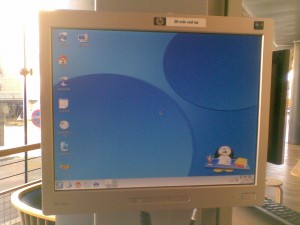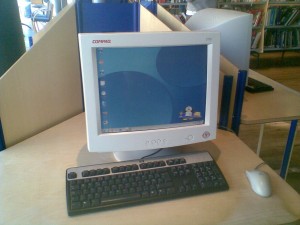As part of a bigger project of mine, I wanted to answer the following questions: How can one tell which physical port a hotplugged usb-device is plugged into on Linux? Can one do this when the device is plugged into an usb-hub (i.e: non-root hub) too? Since this is potentially useful to others out there, I share my findings here.
The usual “lsusb” or “lsusb -v” gives no indication that the kernel knows about the physical topology of the devices connected to an USB bus. However “lsusb -t” does indeed show the topology, so the kernel does know about it and make this info available to user-space. So, how to use this in udev? Prodding some USB storage class devices with udevinfo, shows that there is no attribute that gives this information directly. But, the DEVPATH attribute for USB devices actually contains this information.
For instance, an USB mass storage device connected to port 2 of the root-hub with bus number 2 has the following devpath: “/devices/pci0000:00/0000:00:1d.7/usb2/2-2/2-2:1.0/host12/target12:0:0/12:0:0:0/block/sdb” and a USB mass storage device connected to port 5 of the root-hub with bus number 1 has the devpath “/devices/pci0000:00/0000:00:1d.7/usb1/1-5/1-5:1.0/host5/target5:0:0/5:0:0:0/block/sdb”. It becomes a bit confusing when there are USB hubs involved: “/devices/pci0000:00/0000:00:1d.7/usb2/2-1/2-1.1/2-1.1.1/2-1.1.1:1.0/host16/target16:0:0/16:0:0:0/block/sdb” refers to a device plugged into port 1 of an USB hub plugged into port 1 of a second hub which is plugged into port 1 of the root-hub with bus number 2.
We see that in all cases the information about the physical topology is in the substring just before “:1.0”; “2-2”, “1-5” and “2-1.1.1”, respectively for the given examples. And that the format is “$busnumber-$port” for the simple case of connecting the device directly to the root-hub, and $busnumber-$port1.$port2 -> .$portN for the general case, with N-1 usb-hubs between the device and the root-hub.
Just to show that this works, here is a quick and dirty udev rule and helper python script which parses the devpath and creates a symlink to the first partition of a USB mass storage device under /dev/usb based on the bus and port the device is connected to. Results might look like this:
tree /dev/usb/ Thu Jul 29 17:34:38 2010
/dev/usb/ `-- 2 `-- 2 |-- 2 -> ../../../sdc1 `-- 4 `-- 4 -> ../../../../sdb1
A more useful thing to do might for instance be passing through all devices connected to a certain physical usb-port to a certain virtual machine. Or maybe letting an embedded system responding differently to USB devices plugged into a physically secured root-hub than to one that is available to the user.

